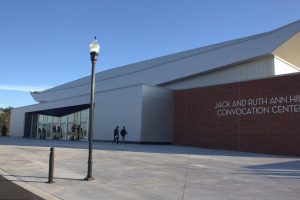GSU Alum stresses the value in government jobs and the liberal arts
February 10, 2015
On Wednesday February 4, a select group of students and professors gathered to discuss government work with Joshua Adler, a former Georgia Southern University alumnus currently working in the intelligence community, to discuss his take on landing a government job.
“Mr. Adler…is an experienced cross-disciplinary social and data scientist with more than fifteen years of experience in the government sector,” Dr. Barry Balleck, associate professor and chair of the Department of Political science, said. “His career has provided him countless opportunities to contribute to America’s foreign and military policy decision making processes at the highest levels.”
Adler holds a B.A. in International Relations from the American University and an M.S. in Strategic Studies from the University of Aberystwyth. While Adler started his collegiate career at GSU, he fell in love with Russian, a language not offered at GSU, and transferred to the American University in Washington D.C. to study it. While a student in D.C., Adler partook in many of the internship opportunities offered in the city, taking two years off to work after graduation before moving to Wales to pursue his Masters Degree.
“The things I learned [at Georgia Southern] and the quality of the instruction here really set me on a good path in life,” Adler said. “I’m so pleased to come advise the next group coming up behind me on things they can do to get ahead with a liberal arts degree — which some of your parents have probably given you grief about.”
Liberal Arts students, according to Adler, make much less than their contemporaries in the scientific and engineering disciplines. He attributes this income gap to the easily marketable skills that accompany scientific degrees, but reassured the audience that this gap evaporates after the first five years, when Liberal Arts majors begin to make much more thanks to their education in not ‘how to do a thing,’ but ‘how to think better.’
“I have very rarely applied specific lessons from any class, but the things I learned in a well-rounded liberal arts curriculum really helped me set up to think, and that’s what you’re learning here,” Adler said. “It’s not specific facts, it’s not specific treaty dates, it’s not how to do specific statistical formulas, but it’s all about how you think, and how you can think better.”
Following up his endorsement of a breadth of learning, Adler cautioned against excess specialization, all but guaranteeing that those who invest their time learning Russian will end up assigned to an account where people speak Spanish.
“The government really is not interested in what you know,” Adler said. “In their opinion you don’t really know what you need to know, they are interested in your ability to learn foreign languages, your ability to take a variety of coursework.”
Speaking on the difficulties of acquiring security clearance, Adler warned students that they don’t live inside of an “academic bubble.”
“If you’re a partier, if you’re into drugs, if you’re into ‘questionable behaviors’ as the government calls them, it’s going to get found out about here,” Adler said. “If this is the kind of career you aspire to, you should start cleaning up your act right now. The government has a policy where they don’t hold past things you’ve done against you, but if you try to conceal something, that’s it.”
Adler highly recommends internships in Washington, calling them some of the most valuable moves he’s ever made.
“One of the things no one ever tells you about Washington is that it’s not possible to get a job in Washington, generally, without being in Washington. Having that summer where you have a Washington D.C. address is the only way you’re ever going to get call backs,” Adler said. “It’s sort of a bizarre fact of life.”
Adler did, however, stress that interns make at most $10 a day, and suggested students look past the obvious CIA route – an agency inundated with applications – and apply to intern at the less popular intelligence agencies.
“Doing this kind of work you’re never going to become rich… you’ll never be particularly well known or famous, but it is amazingly fulfilling,” Adler said. “The people I’ve met and experiences that I’ve had, I wouldn’t trade it for all the millions in the world.”







